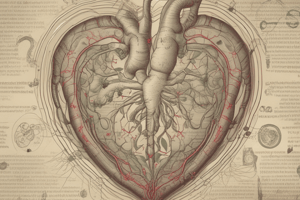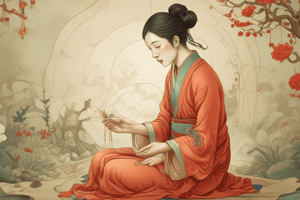Podcast
Questions and Answers
What are the five major elements in Traditional Chinese Medicine (TCM)?
What are the five major elements in Traditional Chinese Medicine (TCM)?
- Metal, Water, Earth, Wood, Fire (correct)
- Wind, Fire, Earth, Water, Metal
- Metal, Wood, Fire, Water, Air
- Air, Earth, Fire, Water, Metal
Which of the following is NOT a key principle of Traditional Chinese Medicine (TCM)?
Which of the following is NOT a key principle of Traditional Chinese Medicine (TCM)?
- The body's energy flow is determined by genetics only. (correct)
- Illness arises from energy imbalances.
- The body is a complex system of interconnected parts.
- The body is influenced by external factors like seasons and emotions.
According to TCM, what is the main function of Qi?
According to TCM, what is the main function of Qi?
- To regulate blood pressure
- To regulate body temperature
- To control digestion
- To circulate vital energy throughout the body (correct)
How do Yin and Yang relate to health in TCM?
How do Yin and Yang relate to health in TCM?
What is the role of meridians in TCM?
What is the role of meridians in TCM?
Which of the following is NOT a diagnostic method used in TCM?
Which of the following is NOT a diagnostic method used in TCM?
What is the meaning of Yin in TCM?
What is the meaning of Yin in TCM?
How does TCM view the relationship between the body and the environment?
How does TCM view the relationship between the body and the environment?
What are the five elements in Traditional Chinese Medicine that represent different aspects of the body's functions?
What are the five elements in Traditional Chinese Medicine that represent different aspects of the body's functions?
What is the primary goal of acupuncture in Traditional Chinese Medicine?
What is the primary goal of acupuncture in Traditional Chinese Medicine?
Which therapeutic approach in TCM is characterized by using heat to stimulate acupuncture points?
Which therapeutic approach in TCM is characterized by using heat to stimulate acupuncture points?
In TCM, which of the following therapies involves the use of food and ingredients to promote healing?
In TCM, which of the following therapies involves the use of food and ingredients to promote healing?
What is the role of Zang-fu organs in Traditional Chinese Medicine?
What is the role of Zang-fu organs in Traditional Chinese Medicine?
Flashcards
Acupuncture Points
Acupuncture Points
Specific locations along meridians where needles are inserted to influence Qi.
Five Elements
Five Elements
Wood, fire, earth, metal, and water; represent the body's functions and their interactions.
Zang-fu Organs
Zang-fu Organs
Internal organs that form a functional system in TCM, interconnected and harmonious.
Moxibustion
Moxibustion
Signup and view all the flashcards
Qigong and Tai Chi
Qigong and Tai Chi
Signup and view all the flashcards
Traditional Chinese Medicine (TCM)
Traditional Chinese Medicine (TCM)
Signup and view all the flashcards
Qi
Qi
Signup and view all the flashcards
Meridians
Meridians
Signup and view all the flashcards
Yin and Yang
Yin and Yang
Signup and view all the flashcards
Acupuncture
Acupuncture
Signup and view all the flashcards
Tongue Diagnosis
Tongue Diagnosis
Signup and view all the flashcards
Pulse Diagnosis
Pulse Diagnosis
Signup and view all the flashcards
Study Notes
Traditional Chinese Medicine (TCM) Theory
- TCM is a complex system of medicine developed and used in China for thousands of years. It views the body as a whole, interconnected system, rather than individual parts.
- The fundamental concept of TCM is based on the balance of Qi, a vital energy, within the body. Qi flows through pathways called meridians.
- Disruptions in the flow of Qi are believed to cause illness. Practitioners diagnose imbalances by observing the patient's overall condition, including pulse, tongue, and body.
- TCM considers the body is influenced by the natural environment and the cycles of nature. Seasons, climate, and emotions are considered.
- Yin and Yang are core concepts. Yin represents receptive, passive, and dark forces. Yang represents active, dynamic, and bright forces. Health is maintained through equilibrium between these opposing forces.
- TCM proposes five major elements (wood, fire, earth, metal, and water). These elements interact and influence each other, representing different aspects of the body's functions and health.
- Acupuncture, a key TCM practice, involves inserting thin needles into specific points on the body's meridians. This stimulates Qi flow and restores balance. Other practices include herbal remedies, dietary recommendations, and massage therapy.
Diagnostic Methods in TCM
- Examining the tongue is a crucial diagnostic tool. The color, shape, coating, and location of tongue patterns can indicate imbalances and conditions.
- Pulse diagnosis involves feeling the pulse at specific points on the wrists. The rhythm, depth, and strength of the pulse are analyzed to understand the patient's condition.
- Symptom evaluation involves analyzing symptoms such as pain, fatigue, and emotional well-being. The nature, duration, timing, and location of symptoms are considered.
- Patient history and lifestyle are vital to examination. This includes details about dietary habits, sleep patterns, emotional states, and environmental factors.
Key Concepts in TCM
- Qi (vital energy): The essential life force that circulates within the body; its balance is crucial for health. It's influenced by various factors.
- Yin and Yang: Complementary forces continually interacting; imbalance causes illness.
- Meridians: Energy pathways carrying Qi; acupuncture points are located along these meridians,.
- Five elements: Wood, fire, earth, metal, and water; balanced interactions contribute to well-being.
- Zang-fu organs: Internal organs are part of a larger functional system. They're interdependent and must be in harmony.
Treatment Approaches in TCM
- Herbs are commonly used in TCM; specific herbal formulas are tailored to address individual imbalances.
- Acupuncture involves inserting fine needles into specific points along the meridians to stimulate Qi flow.
- Moxibustion utilizes heat to stimulate acupuncture points and pathways to influence Qi.
- Tui Na (Chinese massage): Manipulative therapies are used to address imbalances, improving Qi flow.
- Dietary therapy involves using foods and specific ingredients to address imbalances, aid healing, and promote overall health.
- Qigong and Tai Chi: Gentle movement and breath control cultivate inner energy, build strength, and promote well-being.
Studying That Suits You
Use AI to generate personalized quizzes and flashcards to suit your learning preferences.




